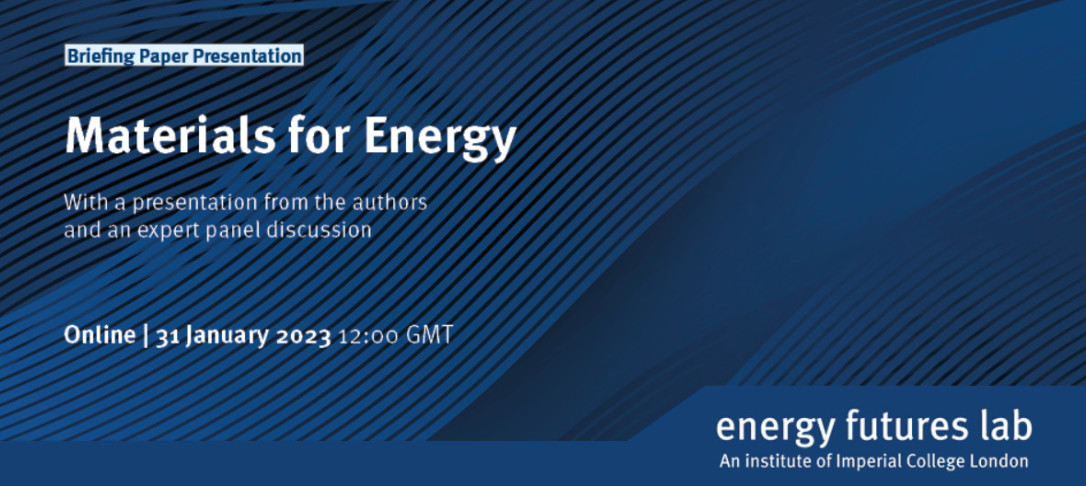
Briefing Paper Launch:
Materials for Energy
The transition to net-zero carbon emissions is a massive global effort, requiring significant and ongoing investment and buildout in new technologies, processes and products. Large quantities of raw materials will be needed to build low-carbon generation, transportation and end-use technologies. The Energy Futures Lab have prepared a Briefing Paper considering the current availability and development of materials for the energy sector. Using four illustrative case studies, it first assesses the issues relating to the availability and production chain of materials which are critical to the production of low-carbon energy technologies. Utilising a technology-based approach, it then investigates the state of development of novel materials in the sector, presenting policy recommendations to improve the R&D chain and accelerate the development of novel materials and more efficient utilisation.
Co-authors:
Dr Aidan Rhodes is a Research Fellow based at Imperial College London. He is currently Energy Policy Briefing Papers Fellow at the Energy Futures Lab, working on preparing a range of accessible briefing papers on topics of relevance to energy sector policymakers and stakeholders.
Previously to this, he was part of the Energy Strategy Fellowship team for the UK Research Councils, which was tasked with creating a prospectus of future skills, research and training needs for the UK energy sector, as well as carrying out a large-scale research project on comparing the effectiveness of national energy innovation systems across the world.
Aidan has also been Knowledge Exchange Associate at the UK Energy Research Centre (UKERC), where he carried out a wide range of activities aimed at connecting and facilitating UK and international energy research efforts.
Dr Jamie Speirs is based in Imperial’s Sustainable Gas Institute (SGI), where he leads the SGI White Paper Series, conducting research on the social, technical and economic issues affecting energy policy in the UK, Europe and globally.
Jamie led the SGI’s most recent White Paper “A Greener Gas Grid: What Are The Options”. This research examines the options for decarbonising gas networks, focusing on technical capability, cost, and carbon emissions.
In his time at the UKERC Jamie conducted systematic reviews of the evidence surrounding contentious topics in the energy arena. As co-author of the Global Oil Depletion report he applied this methodology to examine estimates of future oil production. More recently Jamie has lead systematic research into the availability of critical materials for low carbon technologies, publishing a range of research reports, including the Energy Materials Availability Handbook. In 2012 Jamie co-authored a systematic review of the European and global resource of shale gas for the Joint Research Centre (JRC) of the European Commission (EC).
Phil Heptonstall is a Research Fellow at the Centre for Environmental Policy at Imperial College. Phil leads systematic reviews and rapid evidence assessments within the UK Energy Research Centre’s Technology and Policy Assessment (TPA) team. The TPA team has been part of the UK Energy Research Centre since the centre was established in 2004 and is now in its fourth phase, which started in 2019. The remit of the TPA team is to address contentious issues in the energy policy arena using systematic reviews of the evidence, supplemented by primary research and wider stakeholder engagement where required.
Panelists:
Professor Neil Alford is a Materials Scientist and a Research Area Lead at the Henry Royce Institute. He graduated from St Andrews University and spent 3 years working in South East Asia and South America in the Oil Exploration Industry on wildcat rigs and then worked for ICI for 13 years. His work has focused on materials from high-strength cement to High Temperature Superconductors and functional thin films. Technology transfer is a key focus and Neil’s discoveries have been applied widely in industry, including cellular communications. His research on low loss microwave dielectrics and functional materials led to the development of the first room temperature, earth’s field MASER (a Microwave laser). At Imperial he has served as Head of Department of Materials and Associate Provost.
Emma Schofield is the Platinum Group Metal Research Fellow at the Johnson Matthey Technology Centre, UK. Having spent over a decade researching improvements to PGM recycling technologies, her focus over the past few years has increasingly been on circular economy of critical metals. She was a Commissioner for the April 2021 UK Policy Commission on Securing Strategic Elements and Critical Materials, and as a member of the Critical Minerals Expert Group supported development of the UK Government’s July 2022 Critical Minerals Strategy.
About Energy Futures Lab
Energy Futures Lab is one of seven Global Institutes at Imperial College London. The institute was established to address global energy challenges by identifying and leading new opportunities to serve industry, government and society at large through high quality research, evidence and advocacy for positive change. The institute aims to promote energy innovation and advance systemic solutions for a sustainable energy future by bringing together the science, engineering and policy expertise at Imperial and fostering collaboration with a wide variety of external partners.